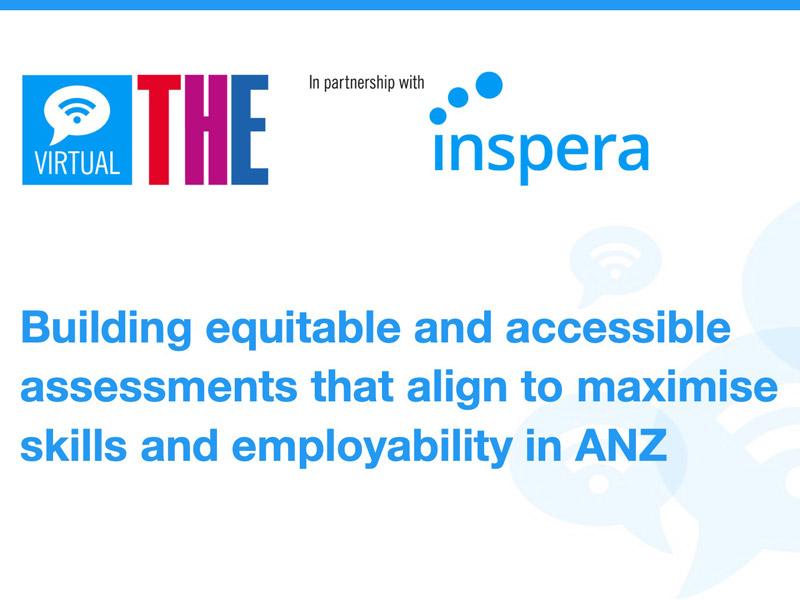
How digital assessment increases inclusivity and enhances employability
Alternative forms of assessment provide greater access and relevant skills for the job market
Embracing digital and alternative forms of assessment can help universities increase inclusivity and respond to shifting student demands in a rapidly changing employment market.
A recent Times Higher Education round table, held in partnership with Inspera, invited a panel of university and industry leaders to discuss how to improve equity, access and employability through digital assessment.
Chair Julia Gilmore, branded content manager (EMEA and the Americas) at Times Higher Education, asked how universities could set the key criteria for an assessment model that enables all students to participate.
Lorraine Gibson van Mil, director of teaching, pure and applied chemistry at the University of Strathclyde, said digital assessment had made the process more “inclusive and accessible than it has ever been”. “In the move back to on-campus, timed exams you can see that you may lose that flexible learning and the agile assessment opportunities,” she said.
Melanie Currie, deputy dean of Nottingham Business School at Nottingham Trent University, said universities were still early in their understanding of the best ways to effectively assess using digital tools. “We have got to get to the root of, what is the best assessment? And then how do you use digital to support that? I think that’s going to take some time,” she said.
Andrew Whitworth, researcher and consultant in digital technologies and reader in the Manchester Institute of Education at the University of Manchester, called for universities to consider alternative assessment forms that “assess the whole process of work”. “It is essential that we break our implicit focus on exams and essays,” he said.
Natalie Laferty, head of the centre for technology and innovation in learning at the University of Dundee, said that rather than replicate the on-campus exam experience online, universities should consider their “philosophy of assessment”.
“It almost feels like a pivotal moment because there is that sense in which people are going back to what was comfortable, old practices when it is a real opportunity to open up that conversation and really think about how we can innovate in assessment and make it more authentic,” Laferty said.
Some academics still need to show that they value alternative assessments in the same way as traditional exams to convince students of their worth, said Ishan Kolhatkar, general manager (UK, ROI, ANZ) at Inspera. Digital assessments “are actually probably more useful in many ways than a traditional closed book exam. It probably requires a mind shift from academics”, he said.
Stephany Biello, dean for learning in science and engineering, and professor of neuroscience and biopsychology at the University of Glasgow, teaches courses from year one that are embedded with digital skills, project work and different forms of assessment. “I think really embedding [digital assessment] throughout your programme gives students employability skills you just can’t match if you don’t do that from the very beginning,” she said.
Lisa Harris, director of digital learning at the University of Exeter, suggested there was still “lots of tradition” in how students were assessed and that other methods could better promote real-world skills. “If we can get the language around assessment expectations updated, I think that would help with the mind shift.”
The panel:
- Stephany Biello, dean for learning in science and engineering, professor of neuroscience and biopsychology, University of Glasgow
- Irene Ctori, associate dean of education quality and student experience, City, University of London
- Melanie Currie, deputy dean, Nottingham Business School, Nottingham Trent University
- Lorraine Gibson van Mil, director of teaching, pure and applied chemistry, University of Strathclyde
- Julia Gilmore, branded content manager (EMEA and the Americas), Times Higher Education (chair)
- Lisa Harris, director of digital learning, University of Exeter
- Rachael-Anne Knight, professor of phonetics, City, University of London
- Ishan Kolhatkar, general manager (UK, ROI, ANZ), Inspera
- Natalie Laferty, head of the centre for technology and innovation in learning, University of Dundee
- Nigel Page, director of learning and teaching, Kingston University London
- Andrew Whitworth, researcher and consultant in digital technologies, reader in the Manchester Institute of Education, University of Manchester
- Adelyn Wilson, dean for international stakeholder engagement, University of Aberdeen
Find out more about Inspera.
